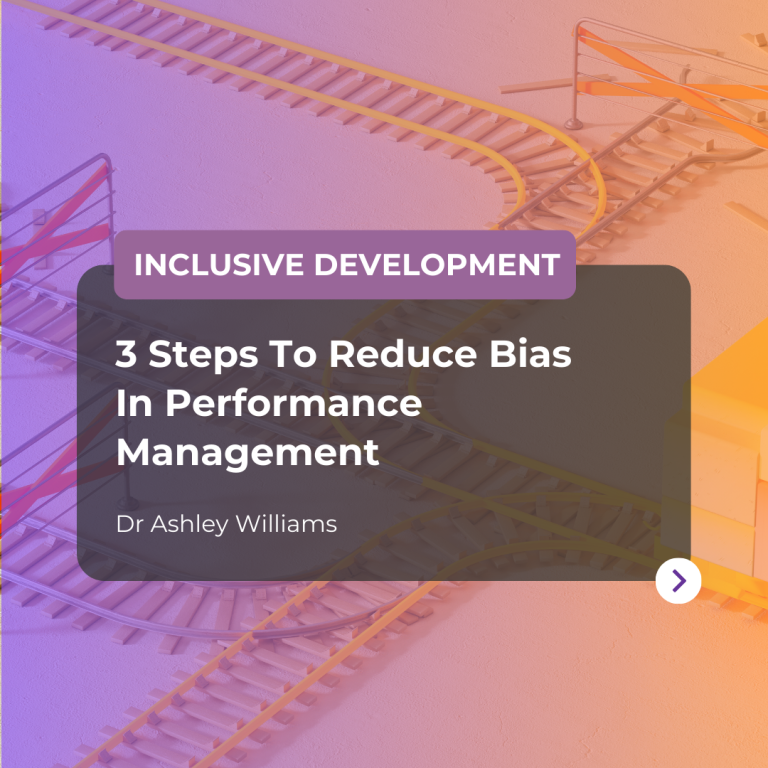Fair performance management is a cornerstone of a thriving, inclusive and successful organisation. When done correctly, performance management can drive several benefits, such as improved:
- Employee engagement and retention
- Employee wellbeing
- Customer satisfaction
- Productivity
- Organisational performance and growth
Yet, despite its pivotal role, performance management is not without its challenges. The process, if not handled carefully, can inadvertently become a breeding ground for unfairness and unconscious bias.
In this blog, we will delve into the nuances of performance management, exploring both types of biases that can impact the performance review process, and steps that management can take to mitigate these risks.
By understanding the intricacies involved, organisations can refine their approaches, fostering an environment where success is not only achieved but is also inclusive and just.
How can bias creep into performance management?
Biases wield a subtle yet powerful influence on performance management, shaping decisions in ways that may not align with objective assessments.
Whether driven by unconscious prejudices or preconceived notions, biases can seep into various stages of the performance management process. From setting expectations to evaluating results, the impact of biases is pervasive.
There are several ways that bias can slip into your performance management processes:
Subjective evaluation
When assessing performance, many rely on subjective judgements instead of objective metrics. When this happens, personal biases can slip into the process, leading to inconsistent evaluations from manager to manager, as different managers may have different perceptions of what constitutes good performance.
Recency bias
Recency bias occurs when managers primarily base evaluations on recent events, overlooking their employees’ long-term performance. This can result in an unfair and inaccurate assessment of their employees’ overall contribution during the evaluation period.
Stereotyping
Stereotyping, a prevalent form of bias in performance management, involves relying on preconceived assumptions about individuals based on attributes such as gender, race, age, sexual orientation, or other demographic factors. This ingrained tendency to categorise people according to these characteristics can significantly influence managerial decisions, often without a solid foundation in facts or evidence.
The repercussions of stereotyping or unexamined bias are profound, manifesting as unequal treatment and impeding opportunities for specific groups within the workforce.
For example, if a manager subscribes to gender stereotypes, this may result in overlooking the true capabilities of an individual, leading to missed opportunities for career advancement or professional development.
In performance evaluations, common gender biases include how women often confront the “likability penalty” – a phenomenon where assertiveness, a trait often rewarded in men, can be perceived negatively in women thanks to gender stereotypes. This bias not only affects how women are perceived but can impact opportunities for advancement.
Confirmation Bias
This cognitive bias refers to the tendency to interpret information in a way that confirms pre-existing beliefs or expectations, rather than objectively evaluating the evidence at hand.
In the context of performance assessments, confirmation bias can lead managers to selectively focus on information that aligns with their initial impressions, reinforcing existing opinions about an employee’s capabilities.
For instance, if a manager holds a preconceived notion that an employee is not a strong team player, they may unconsciously seek out instances that confirm this belief while overlooking evidence to the contrary. This bias compromises the integrity of performance evaluations by skewing perceptions and hindering a comprehensive understanding of an individual’s contributions.
Groupthink
Groupthink is a psychological phenomenon in which people strive for consensus in a group – overriding the desire to present alternative options. Essentially, it’s where we tend to ‘go along with’ the majority, so when this happens, people leaders may align their evaluations with prevailing opinions and suppress diverse viewpoints.
All of these factors can lead to inappropriate assessments of performance, but there are ways organisations can avoid them.
3 ways to mitigate bias in performance management
To reduce the risks of bias outlined above, organisations can:
Implement clear-cut and objective processes for managing performance.
Objective evaluation is crucial for consistent and fair performance management, minimising the opportunity for subjectivity.
Well-structured calibration meetings can support this. They allow managers to come together to discuss and agree upon evaluation methods and evidence required – to ensure consistency in ratings and feedback.
Performance data should also be recorded and accessible for employees and managers to ensure transparency.
Ensure all employees have measurable goals aligned with business priorities
By using clear, measurable goals, employees will have clarity on what they need to do, what metrics they’ll be assessed by, and how their goals contribute to the business. In addition, managers will have less opportunity for subjective evaluation, and the reduced ambiguity will ensure everyone is on the same page.
Upskill managers with bias-busting workshops
We know that minority individuals are less likely to receive regular feedback, mentoring, training and development opportunities.
By engaging your managers and leaders with inclusion workshops, you’ll ensure they understand how their own bias can manifest in their management of others and know how to mitigate this to provide fair opportunities for everybody in their team. This gives workers the opportunity to address their personal unconscious bias and successfully reduce bias individually.
Reducing bias from your performance management processes is crucial to contributing to the success of your business while reaping the benefits for your organisation and employees alike.
Supporting you in refining your performance management process
At Pearn Kandola, we support clients in refining their performance management approach and ensuring that opportunities for bias are minimised. One of the ways in which we can support you is by conducting an objective assessment of your processes using a DEI Audit or focus specifically on a challenge area, such as through an inclusive performance review. These audits will provide you with valuable insight into your existing processes, how they are carried out in practice, and the quick wins that will help you to see a tangible difference in the fairness of your performance management approach. We will further support you in identifying the longer-term strategy that will help you to achieve your aim of eliminating bias in performance management.
Further, we can run unconscious bias workshops for your people managers. With a specific focus on the ways in which bias manifests in performance management, we will help your people managers to identify their personal role in eliminating bias from this process. Using personal insight tools and personalised action plans, we can help your managers to identify the steps that they need to take to see a real difference in their management approach.
If you would like further information about our services, please contact info@pearnkandola.com.







